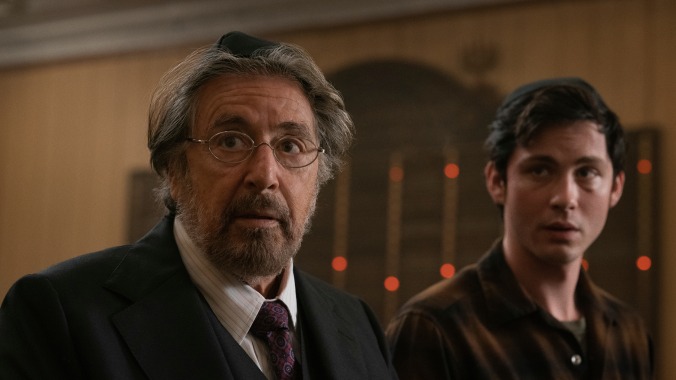Hunters creator David Weil responds to criticism from Auschwitz Memorial

Late last week, the Auschwitz Memorial—the organization that maintains the former Nazi concentration camp, both as a testament to the victims who died there, and as a reminder of the atrocities that occurred—issued a short statement criticizing Jordan Peele and David Weil’s new Amazon series Hunters. Specifically, the Memorial raised issues with the show’s decision to show a fictional “chess game” organized by Nazi guards in the camp using its victims, arguing that inventing new outrages committed by the Nazis will only encourage Holocaust deniers in their efforts to discredit the reporting of history.
Now, Weil—creator and showrunner on the series—has responded to the criticism, issuing a statement outlining his reasons for creating the fictional incident. You can read the full commentary below, but Weil’s overall point is that he feels it’d be disrespectful to use the show to depict the exact circumstances that led to actual people’s misery and death, citing a similar decision to give all fictional survivors of Auschwitz in the show tattoo numbers that were never used in the actual camps, because, “I didn’t want one of our characters to have the number of a real victim or a real survivor.”
Weil goes so far as to describe the chess match scene as being “representationally truthful,” arguing that it offers an acceptable stand-in for the pointless cruelty of the Nazi regime without depicting “specific, real acts of trauma.” He also questions the assertion that the only stories that can be told about the Holocaust are documentaries, arguing that many films have attempted to capture the emotions surrounding its events without adhering strictly to literal truth.
Weil ended the statement by thanking the Memorial for its work, and by re-iterating his assertion that he and it are working toward similar goals. The Memorial has yet to respond to his statement, which you can read in full below:
Years ago I visited Auschwitz and I saw the gates my grandmother was forced to enter decades earlier and the barracks she was forced to live in as a prisoner. I saw vestiges of the nightmarish world she had survived. It was an experience that forever altered the course of my life. It was the moment consecrated in time and memory that I sought to make good on doing my part – however big or however small – to ensure the promise of “Never Again.” I believed then – as I do now – that I had a responsibility as the grandson of Holocaust survivors to keep their stories alive.
While Hunters is a dramatic narrative series, with largely fictional characters, it is inspired by true events. But it is not documentary. And it was never purported to be. In creating this series it was most important for me to consider what I believe to be the ultimate question and challenge of telling a story about the Holocaust: how do I do so without borrowing from a real person’s specific life or experience?
It was for this reason that I made the decision that all of the concentration camp prisoners (and survivors) in the series would be given tattoos above the number 202,499. 202,499 is the highest recorded number given to a prisoner at Auschwitz. I didn’t want one of our characters to have the number of a real victim or a real survivor, as I did not want to misrepresent a real person or borrow from a specific moment in an actual person’s life. That was the responsibility that weighed on me every night and every morning for years, while writing, producing, editing this show. It is the thing I go to sleep thinking about and the thing I wake up working to honor.
In speaking to the “chess match” scene specifically… this is a fictionalized event. Why did I feel this scene was important to script and place in series? To most powerfully counteract the revisionist narrative that whitewashes Nazi perpetration, by showcasing the most extreme – and representationally truthful – sadism and violence that the Nazis perpetrated against the Jews and other victims. And why did I feel the need to create a fictional event when there were so many real horrors that existed? After all, it is true that Nazis perpetrated widespread and extreme acts of sadism and torture – and even incidents of cruel “games” – against their victims. I simply did not want to depict those specific, real acts of trauma.
If the larger philosophical question is can we ever tell stories about the Holocaust that are not documentary, I believe we can and should. HUNTERS, like a myriad of acclaimed films on the subject, does not always adhere to literal truth in its pursuit of capturing the representational truth of the Holocaust. My decision to fictionalize was made in awareness of this debate, and this show takes the point of view that symbolic representations provide individuals access to an emotional and symbolic reality that allows us to better understand the experiences of the Shoah and provide it with meaning that can address our urgent present.
I am forever grateful to the Auschwitz Memorial for all of the important and vital work that they do, for keeping the memory of victims and survivors like my grandmother, Sara Weil, alive. I believe we are very much on the same side and working toward the same goals. And I hope we can continue a dialogue on how to achieve those goals.